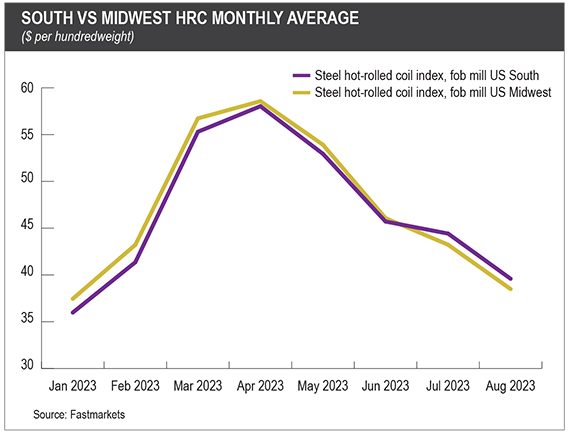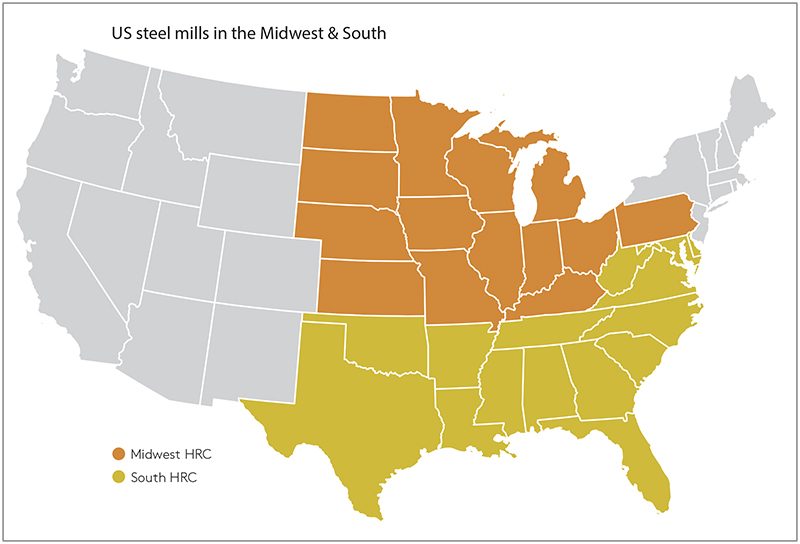There are at least 20 outages scheduled from September through November, but they could have minimal impact on prices despite the current supply tightness, market participants said.
The attention of the US flat-rolled market is focused on the possibility of a strike by the United Automotive Workers (UAW) union at one or more of the Big Three automakers – General Motors, Ford and Stellantis.
“If a strike is called for all three, it would be devastating for the US industry,” a Midwest distributor told Fastmarkets in August.
Most recently, the UAW threatened to strike at any of the three companies that fails to reach an agreement by 11:59 pm Eastern Time on Thursday September 14, when the labor contracts expire.
“I do not see anyone seriously trying to book tons right now as I believe the negativity around the UAW issue is so pervasive that folks are in the wait-and-see mode,” a producer said.
Market participants appeared less worried about the outage season, which is already under way and is likely to last through November. Sources told Fastmarkets that the shutdowns were unlikely to have a significant impact on HRC prices in the Midwest and South because they were planned, enabling market participants to prepare and purchase enough material ahead of time.
Outages are going to be a blip on my radar because they’re planned. Eight planned outages are better than one unplanned [outage].
“Outages are going to be a blip on my radar because they’re planned. Eight planned outages are better than one unplanned [outage],” another distributor said.
An estimated 830,000 short tons of flat-rolled steel production will be taken out in September-November at US mills run by Cleveland-Cliffs, Nucor, US Steel and Steel Dynamics.
Utilization rates among US steel mills have hovered around 76% since May, according to data from the American Iron and Steel Institute (AISI). The average capacity utilization rate was most recently reported at 75.7% in the week ended Saturday September 9, signaling decreasing hot band supply in the spot market.
In that same week, estimated raw steel production – including flat, long, plate and other steel mills – decreased by 2.60% to 1.68 million net tons from 1.73 million tons in the previous week, according to AISI data.
Although prices for hot-rolled steel may be only slightly impacted by the outages, the reduced supply could slow down the fall in prices, with some sources citing lean inventory levels.
“The outages won’t affect prices that much, [they] will slow down the pace of the price drop,” a trader told Fastmarkets.
“Inventories are lean, and maintenance outages might stem the decline,” a second trader said.
Hot band prices in the Midwest have been steadily declining since reaching $59.48 per hundredweight ($1,186.60 per short ton) on March 23. Fastmarkets’ daily steel hot-rolled coil index, fob mill US Midwest has fallen by 43.16% from that peak to $33.81 per cwt on September 6, the lowest level in 2023.
Similarly, market sources based in the US South are also not expecting much of an impact from the outages.
“The South mills are all talking about the outages, but we haven’t seen any changes because of the upcoming outages – the lead times at South mills are at four to six weeks,” a southern distributor said.
Mirroring the price trajectory of the Midwest HRC, Fastmarkets’ weekly steel hot-rolled coil index, fob mill US South peaked at $58.94 per cwt ($1,178.80 per short ton) on March 22, and has since fallen by 41.65% to its lowest level this year at $34.39 per cwt on September 6.
Sources from the region said that although there was a buzz around the mills’ outages, they were also closely watching the possibility of a UAW strike.
“The mills are telling us about the outages, but they all work around the outage schedule – it doesn’t affect small spot buyers like us, maybe if I was a big contract buyer, I would be nervous. People are more nervous about the impact of an auto strike – even if it is only for two weeks, it will affect the markets,” a second southern distributor said.
A strike at the Big Three could have a big impact on the cost of scrap and production levels at steel companies, a third southern distributor told Fastmarkets.

Outages’ impact on lead times
Mills’ lead times are also difficult to gauge due to the slew of outages, with lead times extending from four weeks to six weeks, sources said.
“We have several outages upcoming at plants, so being able to label an HRC lead time is a bit challenging,” a producer said.
“We are seeing some mill lead times move out a bit because of the outage,” a buyer said.
“[Mini-mills] do not seem as concerned with their outages, and we are seeing lead times more in the six-week range for HRC, compared to the three- to four-week range they had been at,” he added.

Rijuta Dey Bera in New York contributed to this report.





